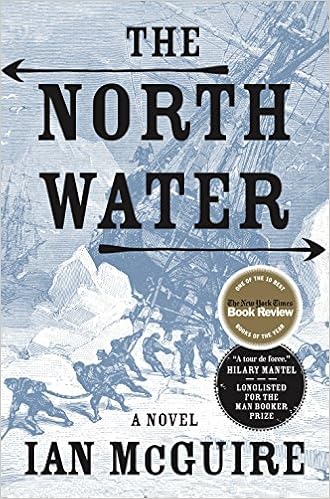Here’s the latest in my very occasional series of 500-word book reviews. Thanks for reading!
The North Water by Ian McGuire (Henry Holt and Co, 2016)
It’s the late 1850’s and the disgraced surgeon, Patrick Sumner, fresh from the Sepoy Rebellion, has signed on to the whaling vessel The Volunteer. With a few exceptions, the crew is the usual assortment of seamen types: base, shambolic, drink-sodden, avaricious, and lazy. There’s also one psychotic murderer. Henry Drax. The building confrontation between Sumner and Drax in the frigid waters of the Arctic Circle powers the core of the novel.
We learn that the whaling trade is played out. The vast pods that once teemed amid the Arctic seas are no more. Brownlee, the ship’s captain knows this will be his last expedition. There’s no longer any profit in it. As Baxter, the voyage’s financer explains to him why he will no longer support whaling: “We killed them all, Arthur…”
Still they go. And before the main whale hunt, the crew cuts a bloody swath across the landscape. They get in bar fights with the crews of other ships. They hunt seals for skins and blubber and oil, after one mass slaughter leaving the ice pack “as spattered and filthy as a butcher’s apron.” They kill polar bears also for the skins, the cubs to sell.
All brutal stuff and McGuire doesn’t flinch at couching his story in most visceral language. Probably unavoidable given the subject matter. Yet, I don’t think I’ve ever read a book at the same time so beautiful. Call it the poetics of savagery. And McGuire overlays the prose with a tone both contemporary and redolent of the nineteenth century: “Sumner remembers watching the iceberg through the gray veil of falling snow: many-storied and immaculate, moving smoothly and unstoppably forwards with the frictionless non-movement of a planet.”
Like Moby Dick and Lord Jim before it (surely inspirations), McGuire’s novel reveals itself as a metaphor of the human condition. Yes, bleak and distinctly lacking a distaff perspective, but still full of worthy insight. Compared to Melville and Conrad however, The North Water is a pared-down text, perhaps a reflection of our age of limited horizons, hemmed in as we are by our understanding of the fragility of this little blue ball.
The North Water is historical fiction; the characters live and die in a world we only barely recognize. Yet, the novel’s focus on the polar region, man’s rapacious scouring of that realm, turns The North Water into a novel of how we are now. In this way McGuire invigorates the genre. It is a gorgeous thing to behold.
